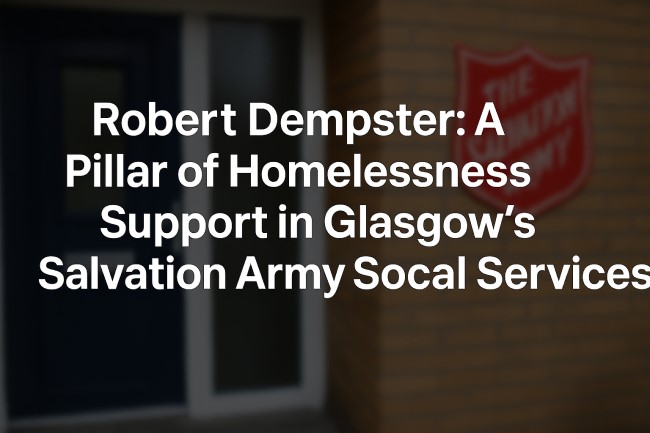Robert Dempster: A Pillar of Homelessness Support in Glasgow’s Salvation Army Social Services

Robert Dempster has dedicated over 38 years of his life to homelessness services in Glasgow, working tirelessly to provide shelter, support, and hope to some of the city’s most vulnerable people. As the Program Manager of Huntershill Court Lifehouse—a specialist 14-bedded cottage-style accommodation for adult males—Dempster’s work embodies compassion, resilience, and leadership. His profound commitment to ensuring safety, dignity, and rehabilitation for men battling addiction, mental health issues, and complex social challenges makes him an invaluable figure within Glasgow’s Salvation Army Social Services.
This article explores Robert Dempster’s extensive career, his educational background, the licenses and certifications that empower his work, and the broader impact he has had on homelessness services in Glasgow. It also highlights the significant role of the Salvation Army Social Services in supporting those at risk and how Dempster’s leadership has shaped this critical provision.
Who is Robert Dempster?
A Lifelong Commitment to Homelessness Services
Robert Dempster began his journey in homelessness support in 1987 and has continuously served the community ever since. For more than three decades, he has been embedded in the frontline of social care, specifically managing services aimed at adult males who face significant barriers such as alcohol and drug addiction, mental health conditions, and social isolation.
His role is not merely administrative but deeply hands-on—managing referrals, overseeing staff, and ensuring that vulnerable men are protected from harm and abuse while receiving tailored support. Dempster’s ability to balance operational oversight with compassionate care is a testament to his professionalism and dedication.
Leadership at Huntershill Court Lifehouse
Huntershill Court Lifehouse, situated in Springburn, Glasgow, operates as a 14-bedded cottage-style residence. The accommodation provides single-occupancy flats or bungalows equipped with cooking facilities and garden spaces, offering a home-like atmosphere for adult men over the age of 18.
Dempster’s responsibility as Program Manager extends beyond day-to-day management. He leads a team of 11 staff members, fostering their professional growth through supervision, training, and appraisal. His leadership ensures that the staff not only deliver high-quality support but also remain motivated and equipped to face the challenges associated with working in this demanding field.
The Challenges and Responsibilities of Managing Homelessness Services
Supporting Men with Complex Needs
The majority of the men accommodated at Huntershill Court face multiple, intertwined issues. Many struggle with substance misuse—alcohol or drugs—compounded by mental health disorders. Some are considered high risk due to previous challenging behaviours or complex social histories.
Robert Dempster and his team support these men through a multi-faceted approach:
-
Safety and Protection: Ensuring that residents are shielded from harm and abuse, which is particularly vital for those at high risk.
-
Referral and Signposting: Connecting individuals to external services such as healthcare providers, addiction recovery programmes, mental health support, and legal advice.
-
Cultural Sensitivity: Accommodating men from diverse cultural backgrounds, some of whom are asylum seekers or awaiting leave to remain status. Overcoming language barriers through interpreters or technology (such as Google Translate) helps reduce isolation and fosters inclusivity.
-
Crisis Management: Addressing emergencies such as overdoses or self-harm incidents promptly and effectively to save lives.
Managing Staff Development and Service Quality
Robert Dempster’s role also encompasses leadership and development of his team. By conducting regular supervisions and appraisals, he ensures that staff members receive the training and support necessary for their professional growth and well-being.
He monitors service quality rigorously, making sure that every individual accessing the service receives the care and respect they deserve. Maintaining high standards is essential in a field where lives and well-being are at stake daily.
Education and Certifications: The Foundations of Excellence
Garthamlock Secondary School: Early Education
Robert Dempster’s formative years were spent in Glasgow, where he attended Garthamlock Secondary School from 1974 to 1978. This local education laid the foundation for his lifelong connection to the Glasgow community and social care.
Licenses and Certifications: Skills for Social Service Leadership
Over the years, Dempster has enhanced his skills and knowledge through formal qualifications:
-
SVQ Level 3-4: These Scottish Vocational Qualifications indicate a high level of competence in social services. They reflect expertise in delivering care, managing support, and understanding the complexities of vulnerable populations.
-
GOALS Trainer Certification: This certification equips Dempster with the ability to deliver personal development programmes designed to help service users set and achieve meaningful goals, a key part of rehabilitation and empowerment.
These qualifications underpin his practical experience and provide the theoretical and procedural knowledge needed to manage a complex social service effectively.
The Salvation Army Social Services: A Beacon in Glasgow
An Overview of Salvation Army’s Homelessness Work
The Salvation Army has long been a cornerstone of social care and support across the UK, particularly in homelessness services. In Glasgow, the organisation operates multiple services tailored to meet the diverse needs of people experiencing homelessness.
Huntershill Court Lifehouse is one such facility, focusing on men who require immediate housing and support in a safe, stable environment. The Salvation Army’s approach emphasises dignity, respect, and personalised care—principles reflected in Robert Dempster’s leadership style.
The Broader Impact of Salvation Army Programs
Services like those managed by Dempster do more than provide shelter; they work toward lasting change by:
-
Reducing repeat homelessness through comprehensive support.
-
Helping individuals tackle addictions and improve mental health.
-
Facilitating access to education, employment, and housing opportunities.
-
Building stronger, more resilient communities.
The Salvation Army’s social services remain critical in Glasgow’s efforts to address homelessness, and managers like Dempster are essential to their success.
Robert Dempster’s Lasting Contribution to Glasgow
Saving Lives and Building Hope
Dempster’s tenure has witnessed numerous instances where timely intervention has prevented tragedies such as overdoses or self-harm. His leadership ensures that these critical moments are met with professionalism, compassion, and swift action.
Moreover, by supporting a culturally diverse group of residents, Dempster promotes inclusivity and integration—helping men who might otherwise feel isolated or marginalised.
Commitment to Staff and Service Users Alike
Recognising the emotional and physical demands on staff, Dempster advocates for ongoing professional development and well-being. This commitment not only improves service quality but also fosters a positive work environment, crucial for retaining skilled workers in the social services sector.
Conclusion
Robert Dempster exemplifies the spirit and dedication required to manage homelessness services effectively. His deep experience, educational background, and unwavering commitment to the well-being of vulnerable men in Glasgow make him a vital figure in the city’s social care landscape.
Through his leadership at Huntershill Court Lifehouse, he has contributed not only to the safety and rehabilitation of countless individuals but also to the professional growth of his staff and the overall quality of services provided by The Salvation Army in Glasgow.
In a world where homelessness and addiction present ongoing challenges, Robert Dempster’s work stands as a beacon of hope, demonstrating how compassion combined with effective management can truly save lives and restore dignity.


